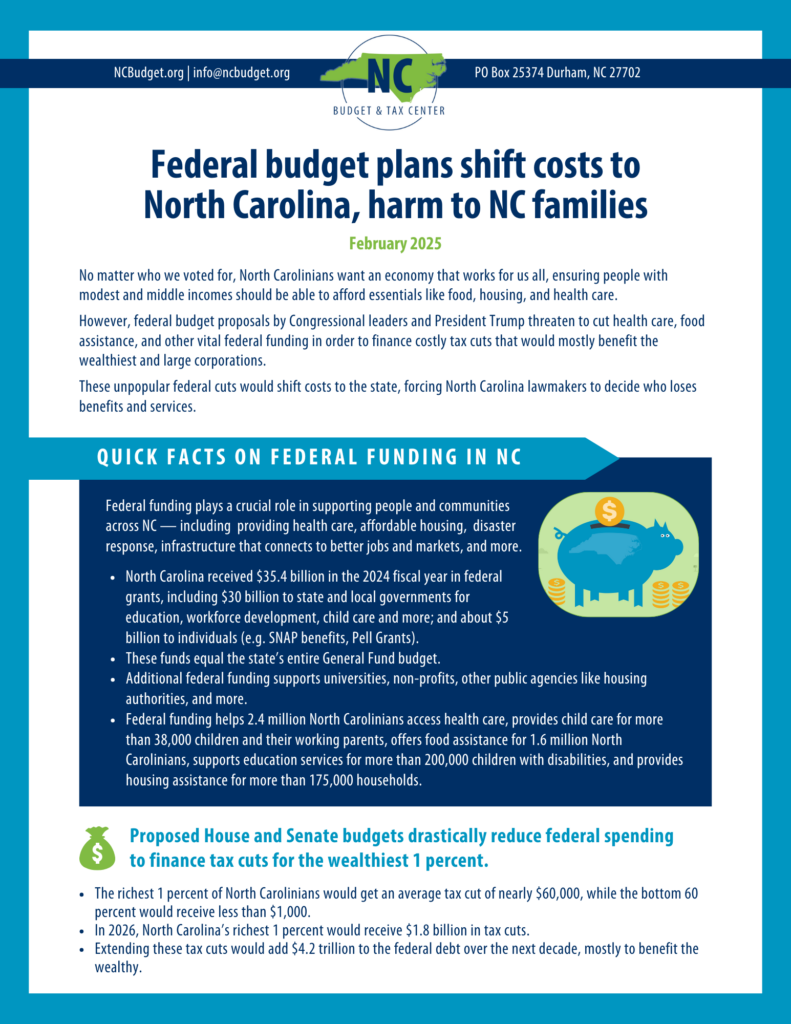Fact Sheet: Federal budget plans shift costs to North Carolina, harm to NC Families

No matter who we voted for, North Carolinians want an economy that works for us all, ensuring people with modest and middle incomes should be able to afford essentials like food, housing, and health care.
However, federal budget proposals by Congressional leaders and President Trump threaten to cut health care, food assistance, and other vital federal funding in order to finance costly tax cuts that would mostly benefit the wealthiest and large corporations.
These unpopular federal cuts would shift costs to the state, forcing North Carolina lawmakers to decide who loses benefits and services.
The Importance of Federal Funding in North Carolina
Federal funding plays a crucial role in supporting people and communities across the state — including providing health care, affordable housing, infrastructure that connects to better jobs and markets, disaster response, and more.
- North Carolina received $35.4 billion in the 2024 fiscal year in federal grants, including $30 billion to state and local governments for education, workforce development, child care and more; and about $5 billion to individuals (e.g. SNAP benefits, Pell Grants).
- These funds equal the state’s entire General Fund budget.
- Additional federal funding supports universities, non-profits, other public agencies like housing authorities, and more.
- Federal funding helps 2.4 million North Carolinians access health care, provides child care for more than 38,000 children and their working parents, offers food assistance for 1.6 million North Carolinians, supports education services for more than 200,000 children with disabilities, and provides housing assistance for more than 175,000 households.
Tax Cuts for the Wealthy at the Expense of North Carolinians
Proposed House and Senate budgets drastically reducing federal spending to finance tax cuts for the wealthiest 1 percent.
- The richest 1 percent of North Carolinians would get an average tax cut of nearly $60,000, while the bottom 60 percent would receive less than $1,000.
- In 2026, North Carolina’s richest 1 percent would receive $1.8 billion in tax cuts.
- Extending these tax cuts would add $4.2 trillion to the federal debt over the next decade, mostly to benefit the wealthy.
How Budget Cuts Would Shift Costs to North Carolina
If enacted, these federal cuts would force state lawmakers to reduce services, increase costs for families, or cut support programs.1https://www.cbpp.org/research/state-budget-and-tax/president-trump-congressional-republican-proposals-would-shift-large
Medicaid Cuts
Medicaid provides affordable health care to North Carolinians without coverage. Access to health care for more people can improve health outcomes, support local economies and rural hospitals, and reduce broader hardships that come with untreated medical conditions. Proposed cuts of $800 billion over 10 years could:
- Reduce federal funding for 600,000 North Carolinians who received health coverage through expansion, likely ending their coverage.
- Cap federal Medicaid payments per enrollee, limiting services for older adults, people with chronic illnesses, and others.
- Implement work requirements that would put at least 1.4 million North Carolinians at risk of losing health insurance.
SNAP (Food Assistance) Cuts
The House budget proposes $230 billion in cuts to SNAP over ten years, impacting families and local economies. SNAP benefits average only $6.20 per person per day.
- Changing eligibility rules would exclude working families with low earnings, making it harder for them to put food on the table and increasing state administrative costs for processing applications for other need-based support.
- Reducing food assistance would mean fewer dollars for people to spend at grocery stores, reducing the household spending power in the local economy and access to nutrition to support health and well-being.
- Federal food assistance has always been 100 percent federally funded. A proposed 25% state match for SNAP funding would cost North Carolina $725 million.
Additional Budget Impacts on North Carolina
Other proposals could:
- Shift disaster response costs from FEMA to the state.
- Cut premium tax credits that keep health care affordable for people using the Affordable Care Act marketplace.
Economic Consequences
Federal funding freezes are already leading to job losses and cuts to federal grants and programs will impact employment levels.
- Some 84,500 federal employees live in North Carolina, with many more jobs supported by federal funding.
- Cuts by President Trump to National Institute of Health research funding have already led to hiring freezes and stalled research. Since 2015, North Carolina has received $17.7 billion in grants for research, with the majority of these funds going to universities.
Take Action
No matter who you are or where you live, the proposals on the table to cut federal funding will impact daily life in North Carolina.
They will affect whether North Carolinians can receive medical care, whether the nearest hospital can serve your family, whether people in your community can afford healthy meals, and whether you can keep your job.
It doesn’t have to be this way. State legislators and North Carolinians must urge the NC Congressional delegation to stop diverting our public funds from our community needs to more tax giveaways for the wealthy.
Footnotes
- 1https://www.cbpp.org/research/state-budget-and-tax/president-trump-congressional-republican-proposals-would-shift-large


